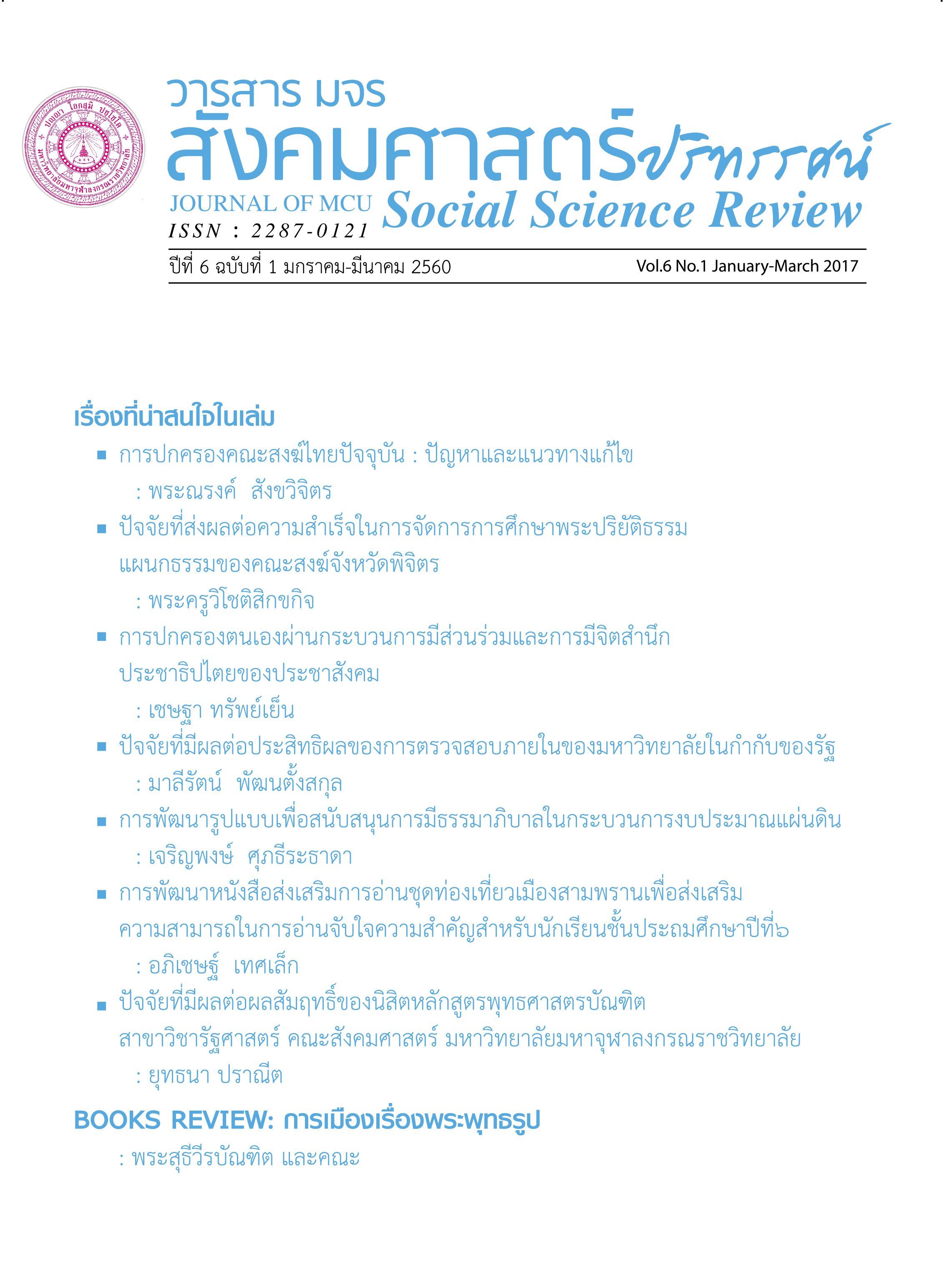รูปแบบการพัฒนาการท่องเที่ยววิถีเกษตรอินทรีย์ในกลุ่มจังหวัดร้อยแก่นสารสินธุ์
คำสำคัญ:
การท่องเที่ยววิถีเกษตร การท่องเที่ยววิถีเกษตรอินทรีย์ ร้อยแก่นสารสินธุ์บทคัดย่อ
บทความวิจัยนี้มีวัตถุประสงค์เพื่อศึกษาบริบทต่างๆ เกี่ยวกับการท่องเที่ยววิถีเกษตรอินทรีย์ในกลุ่มจังหวัดร้อยแก่นสารสินธุ์ ดังนี้ 1) ประเมินสถานการณ์การท่องเที่ยว 2) รวบรวมข้อมูลและประเมินความพร้อมของแหล่งท่องเที่ยว 3) เพื่อศึกษาพฤติกรรมและความต้องการของนักท่องเที่ยวชาวไทยต่อรูปแบบการท่องเที่ยว และ 4) เพื่อเสนอแนะรูปแบบการพัฒนาการท่องเที่ยววิถีเกษตรอินทรีย์ ใช้การวิจัยแบบผสานวิธี การวิจัยเชิงคุณภาพ เครื่องมือที่ใช้ คือ การสัมภาษณ์แบบเจาะลึก (กลุ่มตัวอย่าง คือ กลุ่มผู้ให้ข้อมูลหลัก 4 กลุ่ม จานวนรวม 36 คน) แบบสารวจและแบบประเมินความพร้อมแหล่งท่องเที่ยว (ทั้งหมด 29 แหล่ง) การประชุมกลุ่มย่อย การทดลองจัดกิจกรรมการท่องเที่ยวนาร่อง แล้วนาข้อมูลมาวิเคราะห์ด้วยเครื่องมือ Matrix Table, SWOT Analysis, 7S of McKinsey Model และ Porter’s Diamond Model และสรุปด้วย การอธิบายเชิงเนื้อหา (Content Analysis) ส่วนการวิจัยเชิงปริมาณ เครื่องมือที่ใช้ คือ แบบสอบถาม กลุ่มตัวอย่าง คือ นักท่องเที่ยวจานวน 446 คน วิเคราะห์ข้อมูลด้วยสถิติเชิงพรรณนา ได้แก่ ค่าเฉลี่ย ร้อยละ ส่วนเบี่ยงเบนมาตรฐาน ผลการวิจัยพบว่า รูปแบบการพัฒนาการท่องเที่ยววิถีเกษตรอินทรีย์ที่เหมาะสมสาหรับกลุ่มจังหวัดร้อยแก่นสารสินธุ์จะต้องอยู่บนฐานความพร้อมของทรัพยากรท้องถิ่น คือ ทรัพยากรทางธรรมชาติ ทรัพยากรทางสังคมและวัฒนธรรม และทรัพยากรทางสภาพแวดล้อมและเหตุการณ์สาคัญ และผู้มีส่วนได้ส่วนเสียทุกภาคส่วน อันได้แก่ เกษตรกร ชุมชนท้องถิ่น ผู้ประกอบการในอุตสาหกรรมบริการ ตลอดจนผู้นาและบุคลากรภาครัฐที่เกี่ยวข้อง จะต้องมีความพร้อมในการพัฒนาการท่องเที่ยวอย่างมีส่วนร่วมและบูรณาการความร่วมมือกัน ในการพัฒนาการท่องเที่ยววิถีเกษตรอินทรีย์ในกลุ่มจังหวัดร้อยแก่นสารสินธุ์ให้มีความสามารถทางการแข่งขันในตลาดการท่องเที่ยว สามารถตอบสนองและสร้างประสบการณ์ที่ประทับใจให้กับนักท่องเที่ยวได้ ไปพร้อมๆกับการพัฒนาชุมชนอย่างยั่งยืน โดยผ่านกระบวนการขับเคลื่อนที่สาคัญ คือ 1) การจัดการองค์การชุมชนเพื่อการท่องเที่ยว 2) การพัฒนาทรัพยากรมนุษย์เพื่อการท่องเที่ยว 3)การจัดการห่วงโซ่คุณค่าทางการท่องเที่ยว 4) การจัดการการท่องเที่ยวยั่งยืน 5) การจัดการการท่องเที่ยวสร้างสรรค์ 6) การจัดการการตลาดการท่องเที่ยว 7) การจัดการการท่องเที่ยวเชิงกลยุทธ์ และ 8) การสร้างเครือข่ายทางการท่องเที่ยว
เอกสารอ้างอิง
ดาวน์โหลด
เผยแพร่แล้ว
รูปแบบการอ้างอิง
ฉบับ
ประเภทบทความ
สัญญาอนุญาต
ลิขสิทธิ์ (c) 2018 วารสาร มจร สังคมศาสตร์ปริทรรศน์

อนุญาตภายใต้เงื่อนไข Creative Commons Attribution-NonCommercial-NoDerivatives 4.0 International License.
เพื่อให้เป็นไปตามกฎหมายลิขสิทธิ์ ผู้นิพนธ์ทุกท่านต้องลงลายมือชื่อในแบบฟอร์มใบมอบลิขสิทธิ์บทความให้แก่วารสารฯ พร้อมกับบทความต้นฉบับที่ได้แก้ไขครั้งสุดท้าย นอกจากนี้ ผู้นิพนธ์ทุกท่านต้องยืนยันว่าบทความต้นฉบับที่ส่งมาตีพิมพ์นั้น ได้ส่งมาตีพิมพ์เฉพาะในวารสาร มจร สังคมศาสตร์ปริทรรศน์ เพียงแห่งเดียวเท่านั้น หากมีการใช้ภาพหรือตารางหรือเนื้อหาอื่นๆ ของผู้นิพนธ์อื่นที่ปรากฏในสิ่งตีพิมพ์อื่นมาแล้ว ผู้นิพนธ์ต้องขออนุญาตเจ้าของลิขสิทธิ์ก่อน พร้อมทั้งแสดงหนังสือที่ได้รับการยินยอมต่อบรรณาธิการ ก่อนที่บทความจะได้รับการตีพิมพ์ หากไม่เป็นไปตามข้อกำหนดเบื้องต้น ทางวารสารจะถอดบทความของท่านออกโดยไม่มีข้อยกเว้นใดๆ ทั้งสิ้น





